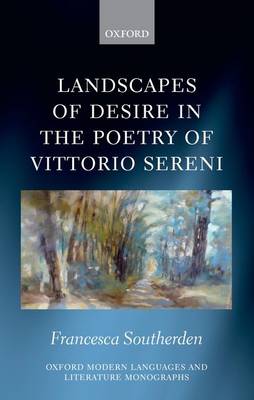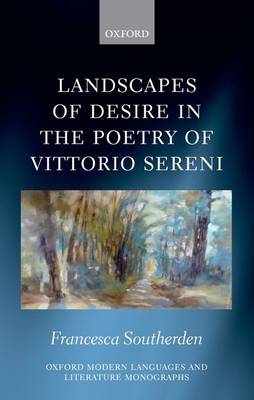
- Retrait gratuit dans votre magasin Club
- 7.000.000 titres dans notre catalogue
- Payer en toute sécurité
- Toujours un magasin près de chez vous
- Retrait gratuit dans votre magasin Club
- 7.000.0000 titres dans notre catalogue
- Payer en toute sécurité
- Toujours un magasin près de chez vous
Description
Landscapes of Desire in the Poetry of Vittorio Sereni is the first book-length study in English on Vittorio Sereni (1913-83), one of the major figures of Italian twentieth-century poetry. It argues that a key innovation of Sereni's poetry is constituted in the way in which, from Frontiera [Frontier] (1941) to Stella variabile [Variable Star] (1981), he reworks the boundaries of poetic space to construct a lyric 'I' radically repositioned in the textual universe with respect to its predecessors: an 'I' that is decentred, in limine, and struggles to subordinate the world to its point of view. Through an interdisciplinary framework that bridges psychoanalytic, linguistic, and poetic theory, two main dimensions of Sereni's work are revisited and reassessed. The first is the role of liminality, which is presented as a condition of writing and as the mark of a desiring subject whose most desired object is the complete poem or total identity that elude him. The second is Sereni's relationship to the Italian poetic tradition, including Dante, Petrarch, Leopardi, and Montale, who mediate his contact with a textual beyond that slips further and further from view. The study maps, through close-reading, the poet's evolving use of deictic reference (spatio-temporal coordinates, demonstratives, personal pronouns) and the progressive transformation of the poem into a place of frustrated desire that occludes fulfilment. It argues that Sereni's particular brand of experimentalism develops from this point and that he represents a unique moment in the history of twentieth-century Italian
poetry in the way in which he adapts pre-existing models of lyric discourse to new modes of expression.
poetry in the way in which he adapts pre-existing models of lyric discourse to new modes of expression.
Spécifications
Parties prenantes
- Auteur(s) :
- Editeur:
Contenu
- Nombre de pages :
- 304
- Langue:
- Anglais
- Collection :
Caractéristiques
- EAN:
- 9780199698455
- Date de parution :
- 21-03-12
- Format:
- Livre relié
- Format numérique:
- Genaaid
- Dimensions :
- 218 mm x 145 mm
- Poids :
- 521 g

Les avis
Nous publions uniquement les avis qui respectent les conditions requises. Consultez nos conditions pour les avis.






